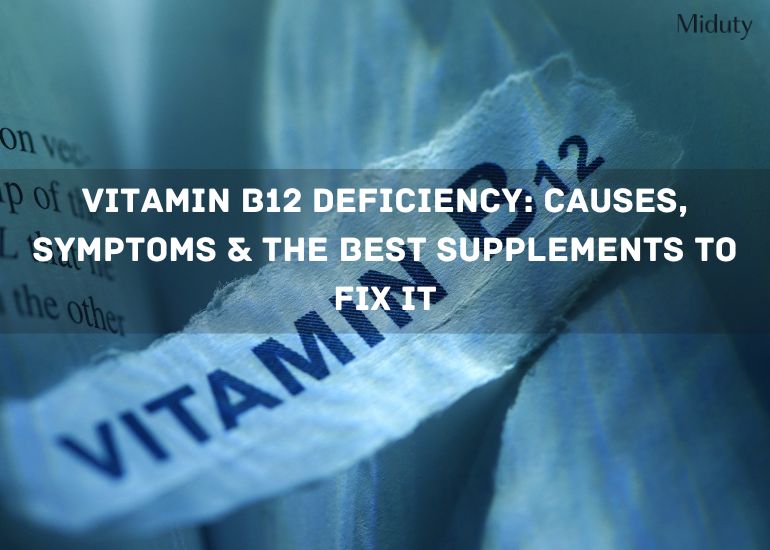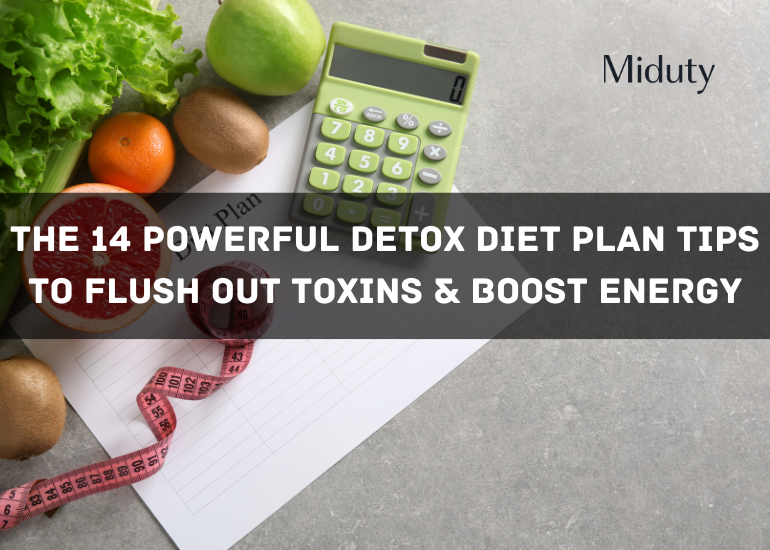
Vitamin B12 Deficiency: Causes, Symptoms & the Best Supplements to Fix It
Vitamin B12 Deficiency: Causes, Symptoms & the Best Supplements to Fix It
Key Takeaways
1. Silent Epidemic – Nearly 50% of Indians suffer from Vitamin B12 deficiency, often without obvious symptoms.
2. Veggie Dilemma – Since plant-based foods lack B12, vegetarians and vegans are at a higher risk of deficiency.
3. Hidden Symptoms – Fatigue, brain fog, mood swings, and even tingling sensations can be early red flags of low B12 levels.
4. Gut Connection – Poor gut health and conditions like IBS, acidity, and low stomach acid hinder B12 absorption, worsening deficiency.
5. Age and Deficiency – The risk spikes after 40, making regular B12 intake crucial for energy, brain health, and immunity.

Have you ever felt so exhausted that even a full night's sleep doesn't seem to help?
Or perhaps you've been dealing with unexplained mood swings, forgetfulness, or dizziness?
Most of the time, we ignore such symptoms being busy in our lives, but they might indicate something more serious - Vitamin B12 deficiency.
Varying from physical to psychological symptoms, vitamin B12 deficiency can affect our day-to-day life. Even when we have a significant amount of Vitamin B12 in our food, 47%of the adults in North India are deficient in Vitamin B12, while this deficiency is prevalent in 57% of infants as well. [1][2]
Today, we'll break down everything you need to know about this essential vitamin, how this deficiency can affect your body, and why you should never overlook the signs associated with it.
Table of Contents
2. What is Vitamin B12 Deficiency?
3. 7 Signs of Vitamin B12 Deficiency
4. Can Vitamin B12 Deficiency a Sign of Cancer?
5. How to Find the Right Supplement?
6. Conclusion
7. FAQs on Vitamin B12 Deficiency
8. References
What is Vitamin B12, and Why Is It Important?
Vitamin B12 is a water-soluble, essential nutrient, that is naturally present in food sources like fish, eggs, or some fortified cereals, etc., and is also available as a dietary supplement. The group of compounds with Vitamin B12 activity are said to be cobalamins because they have the mineral, cobalt in them. Methylcobalamin is the most bioavailable form of Vitamin B12, while other forms may first be converted into methylcobalamin to be absorbed by the body. [3]
If we talk about how Vitamin B12 is important, it helps in many of the bodily functions, including:
- Helps in producing red blood cells, carrying oxygen to tissues and organs
- Maintain a healthy brain and nervous system
- Support the synthesis of DNA and other genetic material
- Convert food into energy
- Promote cognitive functioning and the ability to think
Unlike some other vitamins, our body cannot produce Vitamin B12 on its own, which means you must get it from food or supplements. Common sources of Vitamin B12 include meat, fish, eggs, and fortified cereals.
Also Read: B12 Essentials: 10 Things You Didn't Know It Does for Your Body!
What is Vitamin B12 Deficiency?
Vitamin B12 deficiency is determined through blood tests that measure the level of Vitamin B12 in the bloodstream. Here is a general guide to interpreting the results:
|
Category |
B12 Levels |
|
Normal |
>300 pg/ml |
|
Borderline |
200-300 pg/ml |
|
Deficient |
<200 pg/ml |
Moreover, older people are at more risk as the ability to absorb Vitamin B12 from food decreases with age. However, this doesn't mean adults and children cannot have the deficiency. So make sure you get your Vitamin B12 levels checked, analyze the results from time to time, and keep addressing the potential signs of Vitamin B12 deficiency, your body might be giving you.
7 Signs of Vitamin B12 Deficiency
1. Unexplained Fatigue
Do you often feel drained and lethargic, even after getting plenty of rest? This is one of the most common signs of Vitamin B12 deficiency. Without enough B12, your body struggles to produce red blood cells, which are responsible for carrying oxygen throughout your body. [4]
2. Pale or Jaundiced Skin
This condition involves the yellowing of the skin or white part of the eye. It happens due to Vitamin B12 deficiency because this vitamin is responsible for the synthesis of red blood cells. During insufficiency of Vitamin B12, red blood cells divide less and become large or fragile. This situation makes red blood cells produce excessive bilirubin, responsible for the yellowish pigment, causing jaundice. [5]
3. Pins and Needles Sensation
If you are experiencing tingling in your hands and feet, it might be a sign of Vitamin B12 deficiency. Vitamin B12 produces myelin, which insulates and protects the nerves, and a lack of this vitamin can damage them, leading to this uncomfortable sensation.
This sensation is called Paresthesis, in which you may have a sensation of prickling, tingling, burning, or itching in your feet, hands, legs, or arms.
4. Forgetfulness or Cognitive Decline
Finding it harder to remember simple things could be more than just aging. It can occur in people of any age group, experiencing low levels of Vitamin B12. Low Vitamin B12 levels might contribute to memory problems and, in severe cases, even dementia.
Some common signs of cognitive decline associated with Vitamin B12 deficiency include impaired memory or concentration, alterations in verbal fluency, or lack of attention. [6]
5. Mood Swings or Depression
Vitamin B12 plays a role in producing brain chemicals that regulate mood. People with a deficiency of Vitamin B12 often are at a greater risk of having depression.
The reason behind this is that low Vitamin B12 can lead to increased levels of homocysteine, causing more oxidative stress, DNA damage, or cell death leading to depression or similar conditions. [7][8]
6. Mouth and Tongue Inflammation
Notice a swollen or red tongue? Or perhaps recurring mouth ulcers? These could be signs of Vitamin B12 deficiency. Some people also experience a burning sensation in their mouth. The medical term used for this condition is Glossitis.
Along with Glossitis, one may also have stomatitis, bad taste, swollen lips, burning sensation in the mouth, tongue ulcers, etc., making it hard to swallow or eat properly. [9]
7. Digestive Issues
Symptoms like constipation, diarrhea, or loss of appetite might also signal a deficiency of Vitamin B12.
However, gastrointestinal issues can also result from other health issues such as any active infection, or side effects of some medications. So it is recommended to take into consideration other possible signs of vitamin B12 deficiency and then start working towards fulfilling this essential vitamin in your body.
Also Read: Top Vitamin B12 Foods You Didn’t Know About - The Vegetarian Edition!
Can Vitamin B12 Deficiency Be a Sign of Cancer?
While the deficiency of Vitamin B12 is often linked to dietary insufficiencies or absorption issues, in rare cases, it may be linked to certain types of cancer. To understand this better:
1. Link Between Vitamin B12 and Cancer
- Gastrointestinal Cancers: Conditions like stomach or colorectal cancer can impair the body's ability to absorb Vitamin B12. Tumors in these regions can interfere with intrinsic factor production or damage the intestinal lining, leading to malabsorption.
- Blood-Related Cancers: Low B12 levels may be seen in conditions like leukemia or multiple myeloma, where abnormal blood cell production impacts nutrient absorption and utilization.
2. Red Flags to Watch For
While Vitamin B12 deficiency alone doesn't confirm cancer, certain symptoms in combination with low B12 levels could warrant further investigation:
- Persistent unexplained fatigue
- Significant weight loss
- Gastrointestinal discomfort or chronic diarrhea
- Swollen lymph nodes or frequent infections
3. Why It's Important to Investigate?
Misdiagnosing the root cause of B12 deficiency may delay the detection of an underlying condition. For instance:
- Pernicious anemia (an autoimmune condition leading to B12 deficiency) has been linked to a slightly increased risk of stomach cancer.
- Chronic B12 deficiency might mask symptoms of developing malignancies in the gastrointestinal tract.
Also Read: Why B12 is Your Body's Best Friend: 10 Top Reasons You Need It
How to Choose the Right Vitamin B12 Supplement For You?
While opting for Vitamin B12 supplementation for you, remember, not all Vitamin B12 supplements are equally effective. So while choosing one, consider:
- The Right Form: Methylcobalamin is the most bioavailable and easily absorbed form of Vitamin B12. Other forms, like cyanocobalamin, must be converted in the body before being used, making them less effective.
- Purity and Quality: Choose supplements that are free from artificial fillers, additives, and unnecessary preservatives for better absorption and safety.
- Dosage and Absorption: Look for supplements that provide optimal dosages (1000 mcg or more) and offer better absorption, such as sublingual (under-the-tongue) tablets, sprays, or liposomal formulations.
- Vegan and Vegetarian Options: Since Vitamin B12 is primarily found in animal products, those following a plant-based diet should opt for vegan-friendly methylcobalamin supplements.
Conclusion
Vitamin B12 is a vital nutrient that your body depends on for energy, neurological health, and overall well-being. Vitamin B12 deficiency can come up quietly, giving subtle symptoms like fatigue, mood changes, and difficulty concentrating, which we mostly dismiss, thinking them to be everyday stress. However, ignoring these signs of Vitamin B12 deficiency can lead to long-term complications.
Vitamin B12 deficiency is commonly linked to dietary factors, absorption issues, or aging, it's essential to stay cautious, as it could sometimes signal underlying health problems as well. Regular check-ups, balanced nutrition, and addressing your symptoms help maintain optimal health.

Frequently Asked Questions on Vitamin B12 Deficiency
Q1 - What happens if vitamin B12 is low?
With lower levels of vitamin B12, your body may feel lethargic, and fatigued, and your muscles may become weaker. Moreover, there could be signs such as numbness, weight loss, irritability, or mood swings.
Q2 - Which organ is affected by B12 deficiency?
Vitamin B12 deficiency primarily affects the nervous system and the bone marrow, leading to neurological issues and anemia.
Q3 - Is B12 deficiency a serious condition?
However, it's not a common case, but prolonged Vitamin B12 deficiency can lead to chronic issues with the nervous system or temporary infertility too.
Q4 - What are the 4 stages of B12 deficiency?
The 4 stages of B12 deficiency are: Stage 1 is reduced B12 levels in the blood, Stage 2 is cellular B12 depletion with metabolic issues, Stage 3 is neurological and psychological symptoms, such as anxiety and balance issues and Stage 4 Development of macrocytic anemia (enlarged red blood cells).
Q5 - Which tablet is best for B12?
If you are considering supplementation to fulfill the Vitamin B12 levels in your body, consider the bioavailable forms of Vitamin B12 such as Methycobalamin as it enhances the chances of vitamin b12 getting absorbed in the body.

References








1 comment
Awesome product.